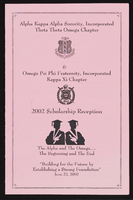Search the Special Collections and Archives Portal
Search Results
Stacey Carrillo, Human Resources Manager, on March 1, 2012: digital photographs
Date
Archival Collection
Description
Image
Jack Wesley Day oral history interview
Identifier
Abstract
Oral history interview with Jack Wesley Day conducted by Claytee D. White on August 19, 2015 for the Boyer Early Las Vegas Oral History Project. Day begins by discussing his upbringing and his service in the United States Army. He describes moving to Las Vegas, Nevada in 1961 to work as a teacher at Rancho High School before joining the Clark County School District administration in 1963. Day talks about race relations at Rancho High School, life in Las Vegas during the 1960s, and being the coordinator for manpower development training classes between the Nevada Department of Education, the federal government, and the Clark County School District. Day also describes the early years of Vo-Tech High School and other aspects of the history of Clark County School District, as well as his experiences working for the district.
Archival Collection
Alma Vining oral history interview
Identifier
Abstract
Oral history interview with Alma Vining conducted by Barbara Tabach, Nathalie Martinez, and Laurents Banuelos-Benitez on February 13, 2019 for the Latinx Voices of Southern Nevada Oral History Project. In this interview, Vining shares what it was like growing up as a child of Mexican immigrants. She talks about her childhood in McAllen, Texas, disclosing her experiences with racial discrimination as a child and as she grew into adulthood. She stresses the importance of education and lifelong learning in relation to her career as a teacher and school principal. Vining moved to Las Vegas, Nevada in 1972 and jumped into the community with her involvement in Nevada Association of Latin Americans (NALA) and on the television program, Minor Key. She shares her experiences earning her Master's Degree in Education at the University of Nevada, Las Vegas. Vining talks about her teaching career and the 30 years of experience gained in the Clark County School District.
Archival Collection

Interview with Linda (Mack) Smith, June 30, 2004
Date
Archival Collection
Description
Text

Transcript of interview with Charlotte Conti by Charles Conti, March 20, 1978
Date
Archival Collection
Description
On March 20, 1978, Charles Conti interviewed hairdresser and physical education instructor of St. Francis School, Charlotte Conti (born Charlotte Anne Easton on December 13, 1941 in Arkansas) at her home in Las Vegas, Nevada. During the interview Charlotte discusses occupations, Mormon Church activity, education, marriage and raising a family in Las Vegas. She then recalls the social significance and communal impact of the annual Helldorado Parade. She also discusses the overall growth and development of Las Vegas, Nevada, from 1953 to 1978.
Text
J. D. Smith oral history interview
Identifier
Abstract
Oral history interview with J. D. Smith conducted by Albert Hewitt on October 31, 1979 for the Ralph Roske Oral History Project on Early Las Vegas. Smith begins by discussing his move to Las Vegas, Nevada in 1927 after buying an office for his dental practice. He describes life in Las Vegas at the time, how the city has expanded and changed, and his career as a dentist. Smith also talks about his time as president of the Nevada State Board of Education. He concludes by elaborating on other aspects of Las Vegas history, such as the crash of Carole Lombard's plane, the Helldorado Parades, and nuclear weapons testing.
Archival Collection
Julio Lucchesi oral history interview
Identifier
Abstract
Oral history interview with Julio Lucchesi conducted by an unidentified interviewer on December 21, 2001. Luchessi discusses his decision to become an architect, as well as his desire to become an aviator. He reads extensively from his autobiography in progess, of his education, his time in the Army Air Corps during World War II, and his decision to move to Nevada. He also talks about the formation and development of the American Institute of Architecture (AIA) in Nevada, his efforts to change the exam process for new architects in the state, and the eleven-year struggle to establish a school of architecture at the University of Nevada, Las Vegas (UNLV) in Las Vegas, Nevada.
Archival Collection

Alpha Kappa Alpha Sorority, Theta Theta Omega Chapter scholarship committee reports
Date
Archival Collection
Description
From the Alpha Kappa Alpha Sorority, Incorporated, Theta Theta Omega Chapter Records (MS-01014) -- Chapter records file.
Text
University of Nevada, Las Vegas College of Business and Economics Records
Identifier
Abstract
The University of Nevada, Las Vegas College of Business and Economics Records (approximately 1969-1998) contain documents created by the College of Business and Economics and the Center for Economic and Business Research at the University of Nevada, Las Vegas. Materials include economic impact reports, student handbooks, accreditation self-evaluation reports, business surveys, activity reports, memoranda from the Dean's office, and copies of Lieder, a publication created by the Lied Institute of Real Estate Studies and published by the College of Business and Economics.
Archival Collection

